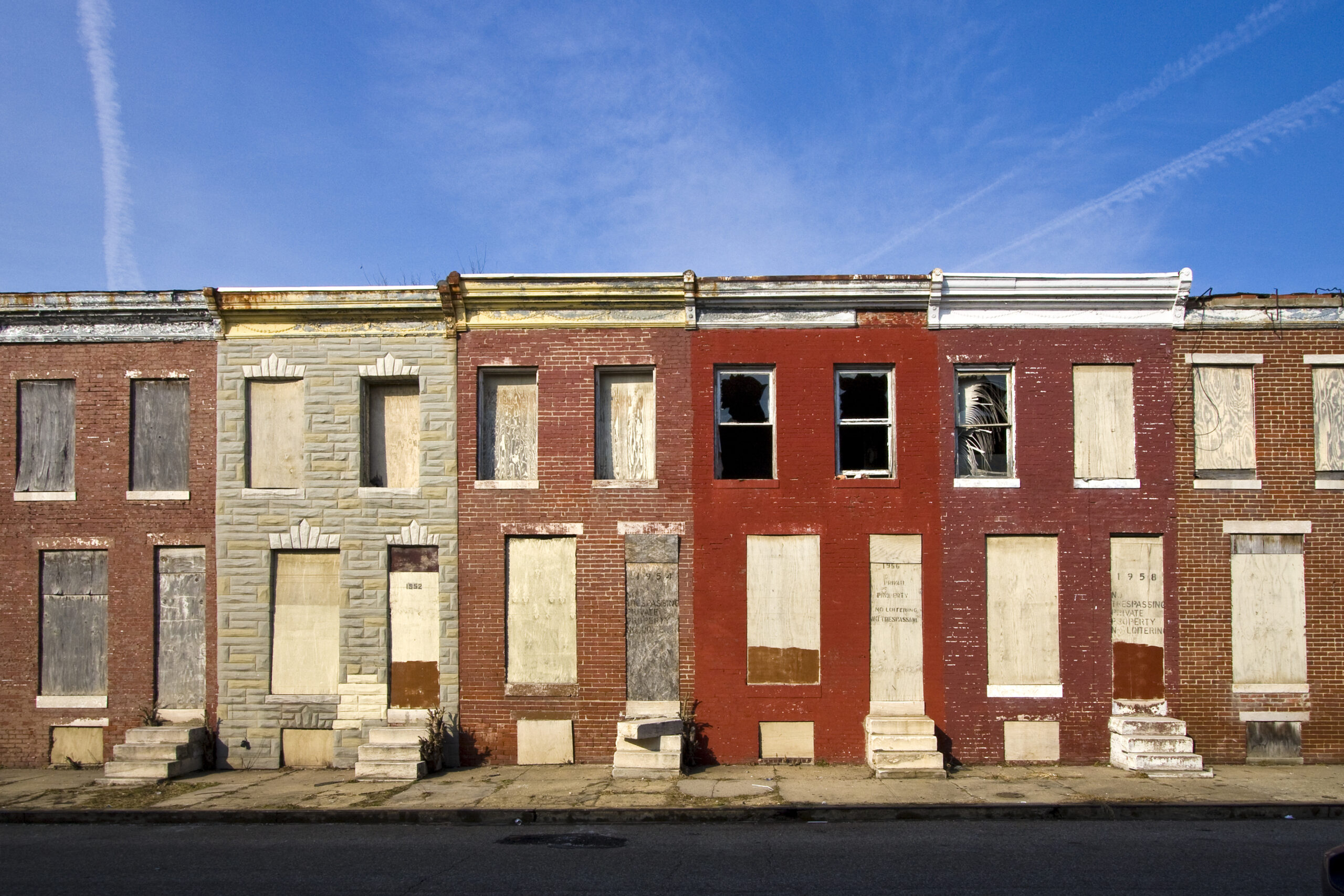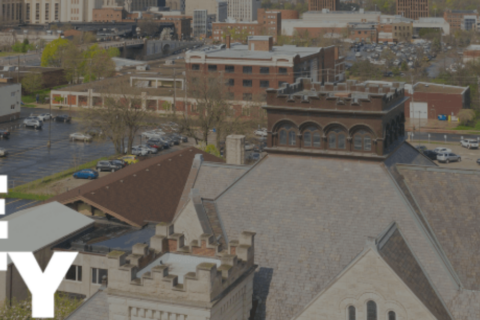The Vacant Property Leadership Institute (Leadership Institute) is an intensive four-day training hosted by Center for Community Progress and National League of Cities. The Leadership Institute brings together leaders from cities across the country to develop and hone systems-based approaches to addressing property vacancy, abandonment, and deterioration in their communities. The Leadership Institute helps participating delegations better understand the interconnected causes of vacant, abandoned, and deteriorated (VAD) properties; assess and reform systems at the state and local level that contribute to vacancy; strengthen working relationships; develop action plans; and grow in their ability to lead profound systemic change.
Like the Great Recession, the COVID-19 pandemic has affected the lives of many and in its wake, the need for strategies which equitably stabilize and restore communities will be crucial. Public, private, and community sector members must develop an intimate understanding of how existing systems facilitate the deterioration of property and how this deterioration is exacerbated by crises such as the pandemic. Understanding the interconnected elements that make up a comprehensive revitalization strategy, and how to manage its implementation, will help municipalities drive meaningful change in the face of obstacles. Avoiding COVID-19 related increases in vacant, abandoned, and deteriorated properties will require communities to take preventative actions now.
The public application period is now closed. The Vacant Property Leadership Institute will take place in February 2022.
Vacant Property Leadership Institute Program Details
- About Host Organizations
- program participants
- Program Overview
- Program Benefits
- Program Cost
- Technical Assistance & Continuing Support
- Letter of Interest Requirements
- Letter of Interest Eligibility and Selection Criteria
- How to Submit a Letter of Interest Using Submittable
- TIMELINE AND KEY DATES
- Frequently Asked Questions
- Contact
About Host Organizations
About Center for Community Progress
Founded in 2010, the Center for Community Progress is the national leader for building strong, equitable communities where vacant, abandoned, and deteriorated properties are transformed into assets for neighbors and neighborhoods. Today, Community Progress has affected change in more than 48 states and seven countries through leadership education and collaborative systems, policy, and practice reforms. Simply, we work to transform “Vacant Spaces into Vibrant Places.” For more information, visit www.communityprogress.org
About National League of Cities
The National League of Cities (NLC) is the voice of America’s cities, towns, and villages, representing more than 200 million people. NLC works to strengthen local leadership, influence federal policy, and drive innovative solutions. Overall, the work of NLC seeks to help mayors, councilmembers and other local elected and appointed leaders build better communities.
In partnership with 49 state municipal leagues, NLC serves as a resource to and advocate for more than 19,000 cities, villages, and towns. The National League of Cities Institute (NLCI) established in 1958, is the research and education affiliate of NLC and is classified by the IRS as a 501(c)(3) charitable and educational organization.
Our Center for City Solutions is the leading source of research, best practices, and technical assistance for city leaders. In addition to our published materials, cohort-based learning and technical assistance is a primary strategy to build capacity and create change in local government. This model enables cities to learn from each other and ensures that NLCI is learning from the practical experience of our members about implementing on-the-ground solutions.
About the Wells Fargo Foundation
The Vacant Property Leadership Institute is made possible by grant funding from the Wells Fargo Foundation. This grant is part of the Wells Fargo Foundation’s efforts to keep more than 200,000 people affected by COVID-19 housed with grants to nonprofit housing organizations across the U.S. Overall, the Wells Fargo Foundation has donated over $225 million to assist people and communities affected by COVID-19.
Program Participants
12 cities from four states have been accepted into the Vacant Property Leadership Institute, including:
Georgia
College Park, Georgia
Perry, Georgia
South Fulton, Georgia
Illinois
Chicago, Illinois
Decatur, Illinois
Kankakee, Illinois
Peoria, Illinois
Rockford, Illinois
Kentucky
Louisville, Kentucky
Winchester, Kentucky
Wisconsin
Milwaukee, Wisconsin
Racine, Wisconsin
Program Overview
The Leadership Institute is scheduled to take place Fall 2021
The rigorous four-day Leadership Institute helps participating delegations better understand the interconnected causes of problem properties, assess and reform systems at the state and local level that contribute to vacancy, strengthen working relationships, develop an action plan, and grow in their ability to lead profound systemic change. Each Leadership Institute cohort is, by design, limited in size, making for a low participant-to-faculty ratio and creating opportunity for individual attention tailored to a participating city’s needs. The limit in size also makes for a highly competitive application process.
Through a mix of classroom sessions and small working group activities, our faculty of top national experts and local practitioners from around the country guide participants through sessions on these and other topics:
- Adaptative leadership: Building individual and collective leaders that thrive in challenging environments
- Data and Neighborhood markets: Using data to understand the conditions that shape revitalization opportunities, constraints, and how to plan accordingly
- Strategic housing and building code enforcement: Developing programs that respond to the varying needs and priorities of different neighborhoods
- Delinquent property tax systems: Reforming tax policies so that they contribute to neighborhood stabilization
- Land banking: Examining how to use this tool to eliminate properties’ liabilities so they can return to productive use
- Vacant land reuse: Demonstrating how to identify, fund, and implement realistic alternatives
- Public health: Exploring the role of public health as a related condition to housing insecurity and neighborhood revitalization
- Disaster resiliency: Confronting the reality of forced displacement and the permanent loss of generational wealth and land for residents of vulnerable communities in the wake of catastrophic natural disasters
Program Benefits
Building productive relationships
The Leadership Institute brings together people who are working on common issues in common places but may not have worked together before. Forging these relationships can spark transformative ideas almost immediately. A leader of a community-based organization in Jackson, Mississippi, met a Mississippi state official as part of the Leadership Institute delegation. Together, they swiftly forged a new partnership that enables the community-based organization to acquire state-owned vacant properties for a resident-owned and resident-controlled community land trust. Now, once-neglected properties are moving into local hands, where they will be stewarded for the community’s benefit.
Moving forward together
In a challenging political and legal environment, it can be all but impossible for even the most well-intentioned local leader to see a way forward. Through the Leadership Institute, Oklahoma City, Oklahoma, team members realized that they weren’t alone – and this newfound strength in numbers could make all the difference. Forming a coalition of local stakeholders to tackle abandoned buildings emerged as one of the most productive, viable ways of navigating political and legal complexities. The coalition is an exciting mix of stakeholders from public agencies, public interest groups, the private sector, nonprofit organizations, and citizen groups. It focuses on understanding vacant, abandoned, and problem properties in Oklahoma City and recommends practical approaches to City, County, and State authorities to begin slowing the problem while preserving and revitalizing neighborhoods.
Creating a coalition for change
Delegations often say that they wish everyone from their hometowns – or even home states – could share in the Leadership Institute experience. One team from Huntington, West Virginia, set out determined to turn that wish into reality and to activate a state coalition of partners committed to positive change. In the months immediately following their Leadership Institute, team members convened the first-ever statewide summit on vacancy and abandonment, bringing home the lessons learned at the Leadership Institute to multiple other cities in the state. This multi-day event fostered statewide knowledge-sharing of best practices, generated a new state legislative reform agenda, and cultivated stronger relationships among practitioners throughout the state.
Shaping legislation and statewide outcomes
Leadership Institute team members almost invariably realize they have a lot in common with the other teams from their state. That natural synergy can give rise to collaborative efforts to knock down common barriers to progress. Many past Leadership Institute participants have successfully championed new state laws to let cities create effective community revitalization tools. One participant said, “The Community Progress Leadership Institute was instrumental in building the buy-in, knowledge, and commitment to land banks in Pennsylvania. When I looked around three years later at who was driving local land bank initiatives, providing the leadership and the expertise, it was the people who had been at the Institute. It was invaluable.”
Program Cost
Community Progress and NLC are committed to ensuring that change-makers across the country are well-equipped with the vision, knowledge, and leadership skills necessary to support strong, vibrant neighborhoods of opportunity. We recognize that each team’s willingness to spend four days out of the office, engaged in this intense training program, is a serious commitment. As a result, there are no tuition fees associated with the Leadership Institute. Each participant is responsible for their own travel costs.
Technical Assistance & Continuing Support
Transformational change takes time, and we view participation in the Leadership Institute as one stage in a long-term relationship. Following completion of the Leadership Institute, Center for Community Progress and National League of Cities will competitively select three communities to each receive up to 100 hours of technical assistance, building off the knowledge provided by the Institute and sustaining engagement to maximize local impact.
Award of technical assistance hours will be based on a thorough review of applications and observation during the Leadership Institute. All other communities participating in the Leadership Institute will become members of a Leadership Institute Virtual Learning Network which will continue to build momentum and position their communities for future technical assistance opportunities.
Letter of Interest Requirements
The LOI will consist of three narrative questions. Additionally, as part of the LOI process, we ask that interested parties submit a letter from the Office of the Mayor or City Manager which expresses the city’s commitment to fully participating in the Leadership Institute.
Submitting a letter from senior leadership will help ensure those who lead the crucial departments/agencies critical to addressing problem properties are able to fully participate in the leadership academy.
Letter of Interest Eligibility and Selection Criteria
All cities, towns and villages in the United States are invited to submit a Letter of Interest (LOI).
Community Progress and NLC will evaluate each LOI based on the following criteria:
- Demonstrated Need: A significant challenge with vacant, abandoned, tax delinquent, and/or other problem properties exists, and addressing underlying systems is necessary;
- Commitment to Addressing Problem Properties: Solving these challenges is a priority for the highest level of local government leaders and decision-makers;
- Commitment to Equitable Community Development: Recognizing the role institutional racism and oppressive systems play in creating problem properties and committing to equitable and just solutions.
- Interest in a Multi-Stakeholder Format: Engaging a multi-stakeholder team can clearly help overcome the city’s challenges related to problem properties; and
- Open Minds: An interest in exploring new ideas and willingness to be challenged about how one’s own City and State address problem properties, and how one exercises leadership.
State Delegations
Each state delegation at the Leadership Institute will consist of two to three city teams and two state advocates, officials, or legislative leaders. If you have relationships with peers in other jurisdictions in your state that are confronting challenges with vacant, abandoned, and problem properties, we strongly encourage you to reach out to them to submit an LOI.
While we encourage municipalities from the same state to apply and reference one another, each city must complete and submit their own LOI. Cities submitting joint letters will not be accepted.
Incomplete submissions will not be reviewed. Letters of Interest that do not respond to all questions will not be considered. No supplemental materials should be provided as part of the Letter of Interest.
How to Submit a Letter of Interest Using Submittable
- Prior to submitting a Letter of Interest, you will need to create a free Submittable account, or sign in with Google or Facebook credentials.
- Once you have launched the LOI portal, you can save a draft of your work if you would like to finish filling out the form at a later date.
- If you need to make changes to your form, please withdraw your submission and resubmit.
- If anything changes with the information you submitted, please request to edit the submission
- The Submittable platform works best on Google Chrome, Firefox, and Safari. Internet Explorer is not supported. Please make sure you are using a supported browser.
You can download Firefox by following the instructions linked here.
You can download Chrome by following the instructions linked here.
For assistance with the Submittable application platform please contact:
Lauren Lowery
Program Director, Housing and Community Development
National League of Cities
lowery@nlc.org
Timeline and Key Dates
Letter of Interest Open – January 27, 2021
Letter of Interest Deadline – February 26, 2021
Notification of LOI Decision – March 5, 2021
Frequently Asked Questions
Center for Community Progress (Community Progress) and National League of Cities (NLC) realize that questions are bound to arise as you consider submitting a letter for the 2021 Vacant Property Leadership Institute. For that reason, we have assembled this FAQ section to memorialize common questions posed about this new program.
This section will continue to be updated as new questions arise.
Don’t see a response to a question you have? Reach out to Justin Godard at jgodard@communityprogress.net or Lauren Lowery at lowery@nlc.org.
Where will the 2021 Vacant Property Leadership Institute be held?
This is still to be announced. We will share this information as soon as it has been finalized.
Will the 2021 Vacant Property Leadership Institute be in-person or virtual?
This event will be in-person. We believe one of the most impactful elements of this program is the ability to meet in-person and have strategic, one-on-one conversations away from the everyday demands of work. With that said, it is our intention to host this program in-person once it is safe to do so. We will continue to monitor the situation with the pandemic and, if needed, will look to adjust the planned dates.
Are communities/states that previously participated in the Community Progress Leadership Institute eligible for Vacant Property Leadership Institute?
Yes! The Vacant Property Leadership Institute is a new program, so we welcome interest from communities who participated in the predecessor program, the Community Progress Leadership Institute (CPLI).
Is the focus still on three communities from one state?
Yes, we have found that this program is most successful when delegations consist of three cities from one state since it allows representatives to collaborate on both city and state level policy needs. However, exceptions have been made to this rule in the past. (As part of the CPLI predecessor program, we have accepted states with just two city delegations.)
It states that Community Progress/NLC will covers tuition fees and participants are responsible for travel costs. Does this mean that Community Progress/NLC will also cover lodging and food? What about per diem?
Community Progress and NLC are prepared to cover all costs delegation members may encounter once on-site for the Leadership Institute. This includes lodging, travel between the hotel and event site, and most meals for the duration of this event. Delegation members will be solely responsible for travel costs from their city to the event site and vice versa at the end of the week. We will not provide delegation members per diem as part of participation in the Leadership Institute.
How many state delegations will be selected?
We will admit up to three state delegations. Selected city delegation team leads will identify up to two representatives from each state (six total) to admit as state delegation members. Each delegation will consist of 6-8 representatives each from two to three localities, and two state advocates, officials, or legislative leaders.
While state level leaders are not eligible to submit an LOI, we encourage state leaders to coordinate with cities and towns in their state to submit their own LOI.
Who should be part of the city teams?
Community Progress and NLC will likely allow 6-8 representatives from each city and will look to see directors/leaders of the departments which play crucial roles in the everyday work of addressing vacant properties. We will also look to see that there is representation from a community-based organization which works in communities most impacted by VAD properties. Community Progress and NLC will share more details about the specific types of people we look to see in a delegation should you move on to the full application round.
It says a letter of support must be included from City executive leadership. Does that also mean that someone from the mayor or city manager’s office must be part of the delegation or lead the delegation?
Municipal Department/Agency Directors are eligible to represent city delegations as the team lead. However, while it is not necessary that the mayor or city manager’s office lead the delegation, Community Progress and NLC will expect to see representation from their office.
While I work very closely with my city/town/village’s government departments and agencies, I represent an outside organization. Can I still submit a letter of interest?
Unfortunately, non-governmental organizations (non-profits, community foundations, land banks, etc.) are not eligible to submit letters of interest for this program. However, non-governmental organizations are eligible to participate as a delegation representative should their city ultimately be selected to participate. We encourage non-governmental organizations to reach out to their contacts in the local government about submitting a letter of interest.
Contact
If you have additional questions about the 2021 Vacant Property Leadership Institute, please contact:
Justin Godard
Program Officer, National Leadership and Education
Center for Community Progress
jgodard@communityprogress.net
For questions about the online application process, please contact:
Lauren Lowery
Program Director, Housing and Community Development
National League of Cities
lowery@nlc.org
Announcing the 12 cities selected for the 2022 Vacant Property Leadership Institute!
View the press release for the program.
Learn more about the Leadership Institute
View the press release announcing the partnership.



